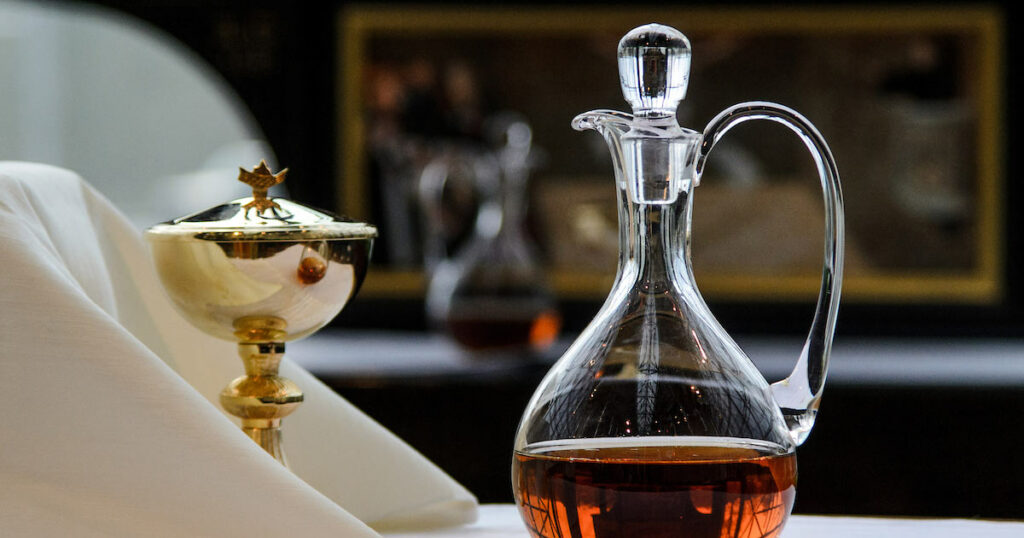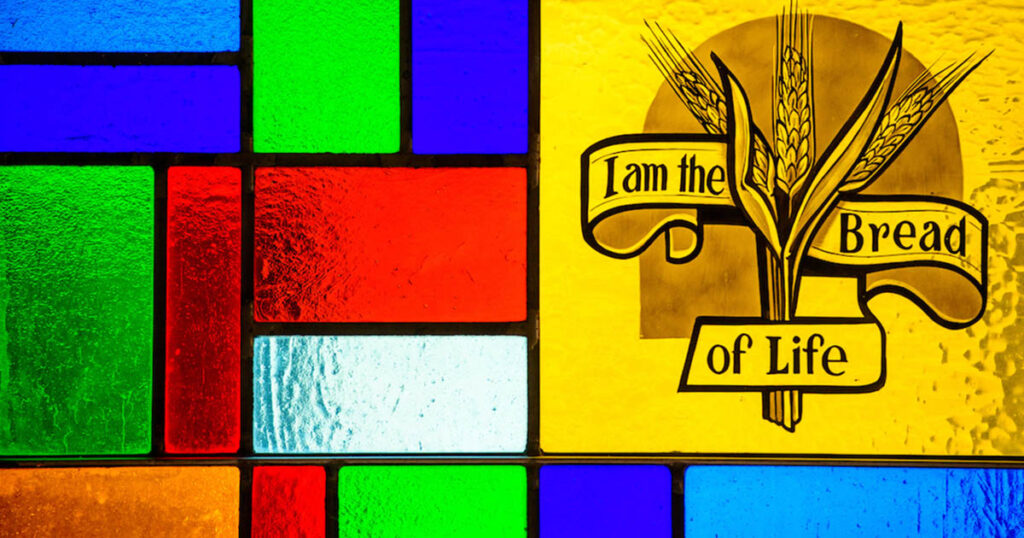6. Jesus protects you … as you proclaim Him.
We need the protection Jesus provides in Holy Communion. After the Last Supper, Jesus warned Peter that Satan would sift him like wheat. Jesus prayed that Peter’s faith would not fail (Luke 22:32) and, with the aid of Christ, it did not fail. Peter now warns us of Satan’s efforts to devour us (1 Peter 5:8–9). He also calls attention to the fact that suffering due to Satan is universal in the church.
We need not wonder if we and those with us in worship each week need Jesus’ personal aid against Satan. As Luther wrote, “If you could see how many knives, darts, and arrows are every moment aimed at you [Ephesians 6:16], you would be glad to come to the Sacrament as often as possible” (LC V 82). Satan launches his sharp missiles at our conscience, seeking to distort it. By self-accusation and brooding despair, Satan would deceive us to think that our sin outweighs Christ’s sacrifice. Conversely, by self-justification and comparison with others, Satan would deaden our conscience in comfortable pride. While we might underestimate the dangers of a bad conscience, Jesus does not.
Jesus invites His gathered people to join Him at His Table in this work.
By means of His own blood, He entered into heaven in the presence of God on our behalf (Heb. 9:12, 24). He now bids us drink that same cleansing blood at His Table. This strong comfort for the conscience defends us against Satan’s missiles. Our confessions say that “the Sacrament … brings great consolation to anxious consciences, so that they too may learn to believe God and to expect and ask from Him all that is good. This worship pleases God [Colossians 1:9–10]” (AC XXIV 7–9).
We should strongly desire such confident faith for ourselves and for all those we love in Christ. A clean and good conscience trusts that Christ’s forgiveness, delivered in His promised gifts, cleanses us from all sin. Such a conscience also expects and asks all that is good from God. A clean and good conscience before the Holy Trinity is a wondrous treasure.
Armor of God
To the saints in Ephesus, St. Paul details the armor Christians take up against Satan’s schemes. We wrestle against the powers of darkness and the spiritual forces of evil (Eph. 6:12). We take up the essential tools in the fight against the evil one: the belt of truth, the breastplate of righteousness, the Gospel of peace, the shield of faith, the helmet of salvation and the sword of the Spirit (Eph. 6:13–18). In Baptism, we put on Christ (Gal.3:27). In so doing, we are belted with truth (Jesus), plated in His righteousness, shielded with faith in Him (Eph. 2:8–9), helmeted with salvation, and sent on our way in the blood-bought, resurrection-breathed peace of Christ. How beautiful the feet of those who speak the Gospel in every vocation. We take up the sword of the Spirit in daily prayer, knowing the Word made flesh prays with us and for us.
But, in the context of this armor of Christ and Satan’s tempting and accusing arrows (Eph. 6:16), Dr. Luther directs us to the Lord’s Supper: “If you could see … you would be glad to come to the Sacrament as often as possible” (LC V 82). The father of lies (John 8:44) masquerades as an angel of light (2 Cor. 11:14). Returning to our Baptism in Confession and Absolution keeps the armor of Christ in place against Satan. Receiving the holy food our Lord serves at His Table does the same.
Belt of truth? Jesus is truth (John 14:6). In the Supper, Christ joins Himself to us intimately, joins us to the Truth. Our communion hymns praise the armor of Christ. Righteousness? “Your righteousness, Lord, cover me” (LSB625:3). Peace? The blood Jesus serves supplies peace (Col. 1:20), and so we sing, “Here is my robe, my refuge, and my peace” (LSB 631:5) and “The grateful peace of sins forgiv’n” (LSB 623:2). Faith? “Let this food your faith so nourish” (LSB 627:10) and “What higher gift can we inherit? It is faith’s bond and solid base” (LSB 618:5). Salvation? “Lord Jesus Christ, You have prepared This feast for our salvation” (LSB 622:1). Sword of the Spirt, that is, the Word of God? “This Word remains forever true, All things are possible with You … Your Word alone suffices me; I trust its truth unfailing” (LSB 622:4, 5). We sing of the helmet of salvation and the Gospel of peace in the Nunc Dimittis. We “depart in peace according to Thy word, for mine eyes have seen Thy salvation” (LSB, p. 199). Christ encounters us at His altar more intimately than Simeon holding the baby Jesus in his arms. This Holy Sacrament replenishes the armor by which God’s children take up the sword of the Spirit in daily prayer, “Restoring and refreshing Them for this world’s strife” (LSB 602:4).
Treasures of grace
These stanzas confess the treasures of grace, treasures that are easily overlooked. We sometimes truncate the Sacrament to “the forgiveness of sins,” omitting a portion — “for where there is forgiveness of sins, there is also life and salvation” (SC, “Sacrament of the Altar”). At His Table, Jesus’ blood fills us with His life. As we sing, “His quenching blood that life restores” (LSB 624:6). Luther said of the Sacrament, “Here He offers to us the entire treasure that He has brought for us from heaven” (LC V 66). The living Christ, here and now, in the flesh, gives blessing upon blessing. He works mightily to replenish in us the armor of Christ to stand firm against Satan’s temptations and accusations. He “comes the pow’rs of hell to vanquish” (LSB 621:3).
Even as Jesus defends, protects and strengthens us with His armor at His Table, He also provides for us wondrous work that we all accomplish together. St. Paul writes, “As often as you eat this bread and drink the cup, you proclaim the Lord’s death until he comes” (1 Cor. 11:26). The word “proclaim” is the same word used for the witness of the apostles. In the Supper, His gathered church weekly proclaims Jesus’ imminent return to the world.
Jesus links His saints to His proclamation of the Gospel. He includes His gathered guests, eating His body and drinking His blood, in proclaiming the only cure for sin. This is grace upon grace from our gracious Lord. The living Christ, here and now, in the flesh, does this.
The Good News preached
Recall Jesus’ response when John the Baptizer sent his disciples to ask,
“Are you the one who is to come or shall we look for another?” And Jesus answered them, “Go and tell John what you hear and see: the blind receive their sight and the lame walk, lepers are cleansed and the deaf hear, and the dead are raised up, and the poor have the good news preached to them. And blessed is the one who is not offended by me.”
(Matt. 11:3–6)
Jesus’ mighty works of healing fulfill the messianic prophecies of Isaiah. But note what Jesus places in the position of importance. Above restoring sight to the blind, weightier than a leper cleansed, even surpassing the raising of the dead is this: “the poor have the good news preached to them.”
Jesus invites His gathered people to join Him at His Table in this work. This work took Him to cross and tomb, to the Father’s right hand. It now brings Him into the midst of His gathered church each Lord’s Day. The living Christ, here and now, in the flesh, proclaims through you, His gathered guests.
Some sermons may not proclaim as clearly as others. C. F. W. Walther called the Lord’s Supper the pulpit of the laity, and from their pulpit, they proclaim Christ crucified and risen and returning. His death is central to every week of our lives. His return is central to every week of our lives.
If, as Luther once said, Satan is closer than our shirts,[1] is it not a wondrous gift that Jesus gives us an even closer armor against Satan? Satan did not become incarnate, but Jesus did. He is flesh of our flesh, and, at His altar, He gives us His body to eat and blood to drink. Through our eating and drinking in faith, Jesus defends us with Himself. Through our eating and drinking, He proclaims Himself. The living Christ, here and now, in the flesh, lovingly and marvelously works for us.
[1] Martin Luther, What Luther Says: An Anthology (St. Louis: Concordia Publishing House, 1972), 399, #1174.






You can read more of my views here at “https://padredave.substack.com”. When I was the solo Pastor in the parishes I served we offered the Eucharist at every service, including funerals and weddings. Those who did not desire to commune weekly were free to remain in the pew, but over time there was 100% participation. We did Early Communion for those younger who desired the Sacrament, their parents preparing them with an age-appropriate Small Catechism and I examined them before admitting them. Amazing how the kids were adamant with their parents about going to church so they wouldn’t miss Holy Communion,.
God’s grace is so amazing!
As does the proclamation of the Gospel and our baptism. Every gift of God in Christ is contained fully in each means of grace. Baptism is present for us daily. The Gospel is present for us daily. And Jesus encouraged us to make frequent use of the Supper for the forgiveness of our sins just as the Gospel and Baptism also forgive sin. May the church avoid adding to Scripture from tradition and human reason that could turn reception of the gifts into another legalistic work (this is the only right way going beyond what Jesus has said) inspire of unimpressive denials that this is not the case.
Unfortunately our new pastor has a habit of banning people from communion (something I’d never heard of protestants doing!) while leaving the statement in the bulletin that Jesus the host, invites all baptized Christians. Naturally, most of the banned people have left for other churches. It is such a sad abuse of position.
No it’s not. St. Paul explicitly states that receiving unworthily brings condemnation on one’s self, and Christians through the centuries have been careful about the state of sin before receiving Holy Communion. There is a reason that the liturgy historically was broken into one part for catechumens, who were dismissed before the liturgy of the Eucharist began. They weren’t yet members of the body of Christ, and as such could not receive absolution in Confession and therefore be cleansed prior to receiving.
Compare 1 Corinthians 11:32 with 11:29. 11:32 speaks of condemnation along with the world. But, 11:29 speaks of falling under a judgment that brings God’s chastisement or discipline so we are not condemned with the rest of the world.
I was taught in the same way Daniel was. The Lord’s Supper frightened me. Then one day I happened to read the rest of the chapter and 11:32 helped me realize I had been given a misconception. I have met others who had the same unfortunate experience.